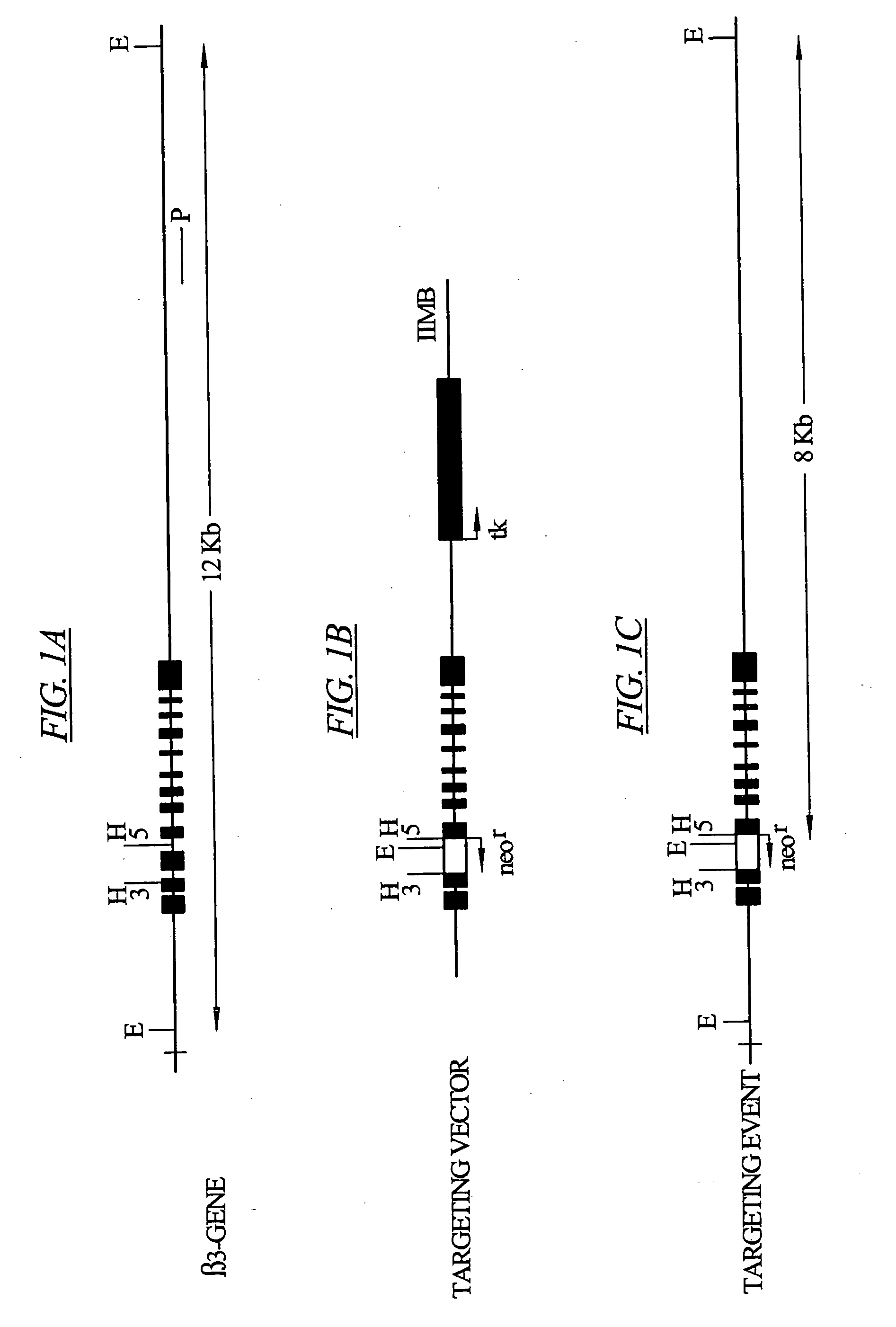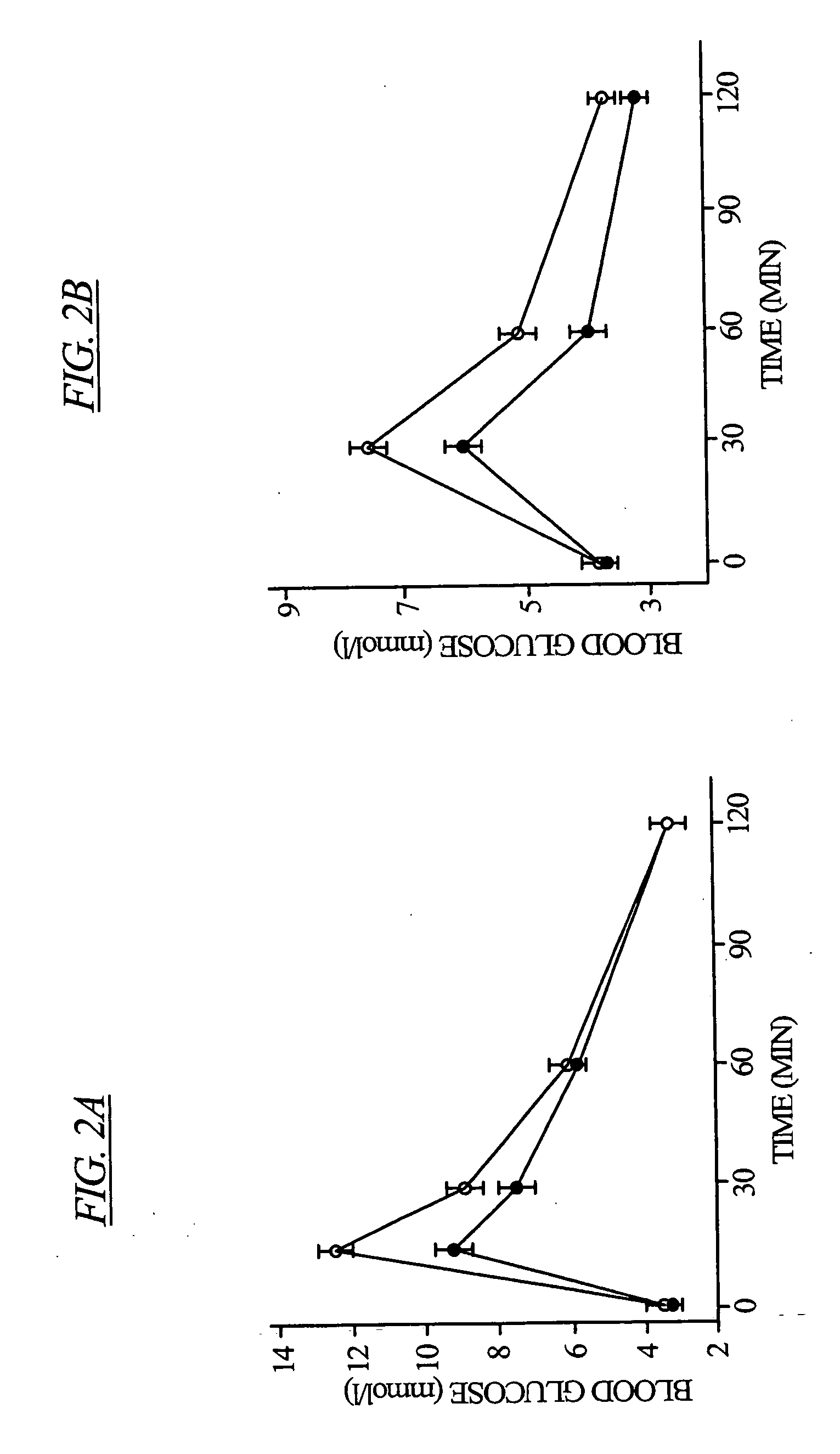Inhibition of the beta3 subunit of L-type Ca2+ channels
a beta3 subunit and ca2+ channel technology, applied in the field of molecular biology, cell biology, voltage gated calcium channels, calcium signaling, can solve problems such as serious side effects
- Summary
- Abstract
- Description
- Claims
- Application Information
AI Technical Summary
Benefits of technology
Problems solved by technology
Method used
Image
Examples
example 1
Preparation of L-type Ca2+ Channel β3 Knockout Mice
[0089] The β3 gene (Murakami, M. et al. 1996 Eur. J. Biochem. 236:138-143 1996) was knocked-out (β3− / −) by replacing part of its exon 3 and the complete exon 4 with a neomycin-resistance gene (neo). Targeting vector IIMB was prepared, starting with the pMCl neoPolyA vector (Stratagene) by replacing a 1 kb HincII (H) fragment, containing part of exon 3, exon 4, and part of the following intron of the mouse 3 gene, with the neomycin resistance cassette (neor). (See FIG. 1.)
[0090] For generation of β3− / − mice, linearized targeting constructs were electroporated into R1 embryonic stem (ES) cells (Nagy, A. et al. 1993, Proc. Natl. Acad. Sci. USA 90:8424-8428) and recombinant clones were selected with G418 and ganciclovir. Three out of 470 ES cell clones with predicted genomic structures for the targeting vector IIMB were identified and selected. Selected ES cell clones were microinjected into C57BL / 6 blastocysts and transferred into th...
example 2
Glucose Tolerance of L-Type Ca2+ Channel β3 Knockout Mice
[0093] Intraperitoneal and oral glucose tolerance tests were carried out on the L-type Ca2+ channel β3 knockout mice. For the intraperitoneal glucose tolerance tests, 2 g D-glucose per kg bodyweight were injected intraperitoneally. For the oral glucose tolerance tests, mice were given 1.2 g glucose per kg bodyweight. In both glucose tolerance tests, blood samples were collected by tail bleeds.
[0094] There was no significant difference in fasting blood glucose levels, however β3− / − mice demonstrated a more efficient glucose homeostasis, exemplified by the more effective glucose removal from the blood, compared to wild type mice. (See FIG. 2).
example 3
Insulin Release in Isolated β3 Subunit Deficient Isolated Pancreatic Islets
[0095] Islets of Langerhans were isolated by collagenase digestion and maintained overnight in RPMI 1640 culture medium (Flow Laboratories, UK). Single cells, obtained by shaking the islets in Ca2+-free medium, were seeded into plastic dishes. For measurements of insulin release, islets were pre-incubated in Krebs-Ringer bicarbonate buffer (KRBB) for 30 min at 37° C. Groups of 3 islets were transferred to tubes containing 0.3 ml KRBB with test substances and incubated for another 30 min at 37° C. The incubation was terminated by cooling the samples on ice. Samples were stored at −20° C. until insulin was analyzed. There was no difference in insulin secretion at basal glucose concentration (3.3 mM glucose), whereas at stimulatory concentrations of the sugar (16.7 mM glucose) islets from β3− / − mice showed significantly higher insulin release, approximately 200%, compared to islets from wild type mice.
[0096] T...
PUM
| Property | Measurement | Unit |
|---|---|---|
| concentrations | aaaaa | aaaaa |
| electric field | aaaaa | aaaaa |
| pH | aaaaa | aaaaa |
Abstract
Description
Claims
Application Information
 Login to View More
Login to View More - R&D
- Intellectual Property
- Life Sciences
- Materials
- Tech Scout
- Unparalleled Data Quality
- Higher Quality Content
- 60% Fewer Hallucinations
Browse by: Latest US Patents, China's latest patents, Technical Efficacy Thesaurus, Application Domain, Technology Topic, Popular Technical Reports.
© 2025 PatSnap. All rights reserved.Legal|Privacy policy|Modern Slavery Act Transparency Statement|Sitemap|About US| Contact US: help@patsnap.com



